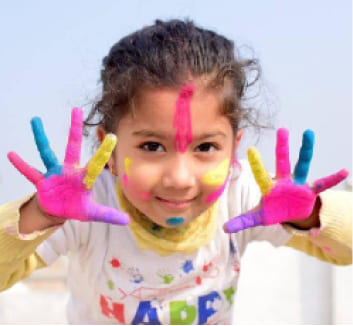Importance of messy activities in a Child’s overall development in Preschool Curriculum

Also, Messy activities provide opportunities for children to explore their senses. They can touch, smell, and taste different materials. This type of play helps children to develop their sensory processing abilities and can be especially beneficial for children with sensory processing disorders.
Why should messy activities be encouraged in children?
- Messy activities help children to be creative and use their imagination.
- It is a great way for them to learn about new things and explore their surroundings.
- It also helps them to develop their fine motor skills as they learn to manipulate different materials.
- Messy activities also promote problem-solving skills, as children must figure out how to complete the task.
- Lastly, allowing children to get messy is important as it is a great way for them to release pent-up energy and emotions.
How can parents encourage their children to engage in these activities?
- Parents can provide opportunities for their children to engage in messy activities by setting up sensory tables or stations with various textures and materials.
- Parents can also encourage their children to get messy by planning outdoor activities that involve mud, sand, or water play.
- Finally, parents can allow their children to explore and experiment with different materials and see what they come up with on their own!
Examples of messy activities for kids
Some examples of messy activities that can be beneficial for children include:
- Painting with finger paints or watercolours
- Drawing with crayons or chalk
- Playing with clay or dough
- Doing puzzles or building block towers
- Finger painting is a great way for kids to express their creativity while developing fine motor skills.
- Working with clay can help kids to improve their hand-eye coordination as they mould and shape the clay into different forms.
- Puzzles and building blocks are excellent for promoting problem-solving skills and spatial awareness.
- Mud play
- Gardening
- Walking on colours
- Easel board painting
Conclusion
Overall, it is evident that messy activities play an important role in a child’s development. From fostering their creativity to teaching important life skills, messy activities provide numerous benefits that help children grow and learn. So the next time your child wants to make a mess, don’t hesitate to let them and, as a parent, be a part of the same to boost your child’s confidence and sense of exploration.